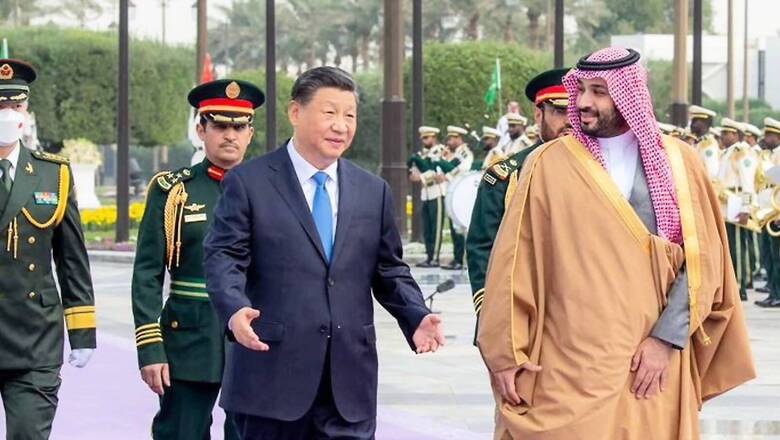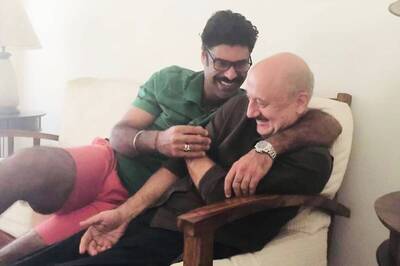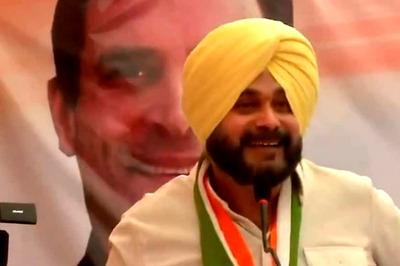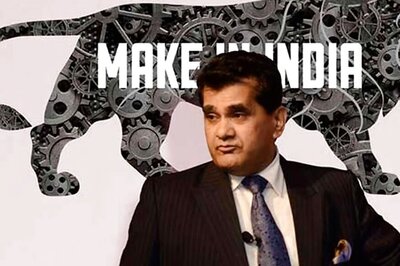
views
Reports about Chinese President Xi Jinping’s ‘milestone’ Riyadh visit, and separate meetings with the Gulf Cooperation Council (GCC) and the Arab League leaders, apart from signing $30 billion deals with host Saudi Arabia should have upset Beijing-watchers in New Delhi and Washington. India might have missed the bus that was waiting for it, and now the ball is no longer in New Delhi’s court to keep Beijing out of the Gulf-Arab region and Africa-Levant, by extension.
For a few years now, hard-core Hindutva social media activists have sounded the bugle when Prime Minister Narendra Modi got a rousing reception from every Arab nation (read: Islamic) he visited since coming to power in 2014. They also celebrated the consecration of Hindu temples in Abu Dhabi and Dubai, that too with acknowledged patronage from the local emir, as if it was the personal achievement of the Prime Minister.
Barring Saudi Arabia, Gulf-Arab nations have been opening up to non-Islamic faiths over the past years and permitting and patronising Hindu temples is a part of the larger scheme. It’s understandable even otherwise as 3.4 million or 38 percent of the local population in the UAE are Indians. A substantial number of them are Hindus from across India. When they were opening up to other faiths, they found no reason to hold back permission for Hindu temples.
Voice of the people
It is equally wrong and short-sighted for anyone — Indian, American or European — to conclude that Riyadh warming up to China owed it to the ‘Khashoggi affair’, where the US particularly humiliated Saudi Arabia’s Crown Prince, the all-important Mohammed bin Salman (MBS), and imposed sanctions on him. Though not necessarily linked to Xi’s Riyadh visit, Washington recently granted immunity from prosecution for MBS.
It is unlike the suspended US visa sanctions against PM Modi over the ‘Gujarat riots’, as he could be presumed to be going out of office one day and the sanctions could reappear. In theory, it is also the case with Prince Salman, but barring an unexpected coup, he could only be going up the ladder to become King one day — and not lose his present job.
Islamic emirates and autocrats have been concerned about the possible eruption of the ‘voice of the people’ since the 1978 Iranian Revolution. Then, it was about the local population’s non-acceptance of the American way of life and governance associated with Shah Reza Pehlevi, whom the mullah-led revolution under Ayatollah Ruhollah Khomeini overthrew. The outcome of the revolution, especially the stricter enforcement of the Islamic Shariah, in the day-to-day life of the common people, was not acceptable in a region that was spoiling to change with the oil boom of the seventies.
The second occasion happened post-9/11 when the US branded Iran, Iraq and North Korea as the ‘Axis of Evil’ and wanted to promote democratisation in these countries and West Asia countries as well. If Saddam Hussein’s Iraq was thus ‘liberated’, then followed the ‘Arab Spring’ in Tunisia, Libya, Egypt, Yemen, Syria and Bahrain, like the successful ‘Orange Revolution’ in Ukraine.
The difference between the two phases is palpable. In the case of Shah’s Iran and also the Philippines’ Ferdinand Marcos, the revolution was against an ‘American stooge’. In the post-9/11 phase, the US was seen as the ‘instigator’.
West Asian governments and their hereditary rulers refused to believe that US agencies were not behind the mass protests. They were even less convinced that they would not be (America’s) next target if they began acting on issues, be it Israel on the one hand and China on the other.
Indian Ocean umbrella
Through the past two decades, individual Gulf-Arab nations and their GCC and Arab League members have been sending out signals for India to take the political lead, for all of them to identify under a common ‘Indian Ocean umbrella’. It was not only the nations towards India’s West. Southeast Asian nations (and possibly ASEAN as a grouping), towards India’s East, also had a similar idea of politically uniting under India, in international affairs, but not giving the impression that they were all ganging up against Uncle Sam. Even recently, Indonesia has called upon the European Union to join hands to fend off American trade practices.
As India did not take the lead when hinted at, there is no knowing if the West and East of India would have met at the centre-point in the geo-political calculus, that is India. The reason was not far to seek. Pre-occupied with the ‘civilian nuclear deal’ with the US for its own reasons, New Delhi was careful not to identify itself politically with such initiatives. Economic cooperation with both sides, individual nations and collectives was fine, even select strategic ties as with Vietnam, viz China, too was okay — but nothing beyond it.
Today, New Delhi is seen as being assertive for its own cause whether or not it is to the liking of a friend in the United States. The decision to buy Russian oil after the West had imposed sanctions in the wake of the Ukraine war is a pointer.
The confidence with which External Affairs Minister (EAM) S Jaishankar has been expounding the Indian position in global capitals in the past months may not be reminiscent of Indira Gandhi’s assertiveness in the run-up to the Bangladesh war but comes somewhere near it. So is PM Modi’s veiled frankness in telling Russian President Vladimir Putin at the Samarkand SCO summit what India thought about the ‘era of war’ having ended.
India is trying to strike out a middle path, a niche for itself in the global arena, going beyond the immediate South Asian region, to which at least China wants to tie down. The question is — if India can evolve as an honest negotiator for Global South vis the industrialised North, not just on the economic front but also in political matters. Here, China with its veto vote in the UN Security Council (UNSC), and a self-serving, unprincipled approach to domestic politics in Third World nations, has a starting advantage.
India almost had an unassigned veto before the end of the Cold War, when New Delhi and Moscow gelled better than in the interim, as the latter used the veto at India’s behest on occasions — whichever be the nation targeted by the West. The question is if India could use the now-revived bonhomie with Russia, to carve out a new niche without which, its aspirations to become the leader of the Global South will face limitations.
Unlikely partners
It does not mean that the Chinese foray into the Gulf-Arab and extended Africa has only politics behind it. For China and Xi, even trying to wean away Saudi Arabia and other Gulf states out of the all-American embrace since the post-colonial era is as much an achievement as it is adventurous. For the hosts, in China they get an America without its military muscle, yes, but a friend who does not interfere with their internal politics — democracy, et al, and a friend who has the UNSC veto as the US.
But there is more to the relation, in the form of economics, at times combined with politics. The Saudi deal, permitting Chinese tech-major Huawei to install 5G mobile telephony runs on the face of the US, India and all other nations that see it as ‘spyware’ and worse. China, for instance, is the largest trading partner of Saudi Arabia. It is also the largest importer of hydrocarbons from the Gulf-Arab region. They are, thus, mutually dependent.
China also needs to hedge, even if belatedly, the huge losses that it should expect to incur in the BRI project funding, as is becoming increasingly visible. For instance, if Beijing is unable to or unwilling to re-schedule the debts of Sri Lanka, which is in an economic soup of Chinese making, it also owes to the possibility of other debtor nations seeking similar concessions.
In a way, the Sino-Gulf bhai-bhai ties of the kind may be an opportunity for Indian strategic thinkers to come up with out-of-the-box solutions, where India can create a global constituency to call its own, independent of the US, Russia or Europe, and without a UNSC veto. That takes a lot of courage over the medium and long terms and a lot more clarity.
By deciding its ‘oil destiny’, uninfluenced by either the US or even Russia, the supplier New Delhi has made a point. Now it has to live up to it, live with it, and also grow out of it — to something bigger and better, in this year when New Delhi is the chair of the G-20 grouping too. China will have to wait, having taught the world how to withdraw into a shell in its transitional years, which in fact ran into decades, before striking out, striking big and hard!
The writer is a Chennai-based policy analyst & political commentator. Views expressed are personal.
Read all the Latest Opinions here




















Comments
0 comment